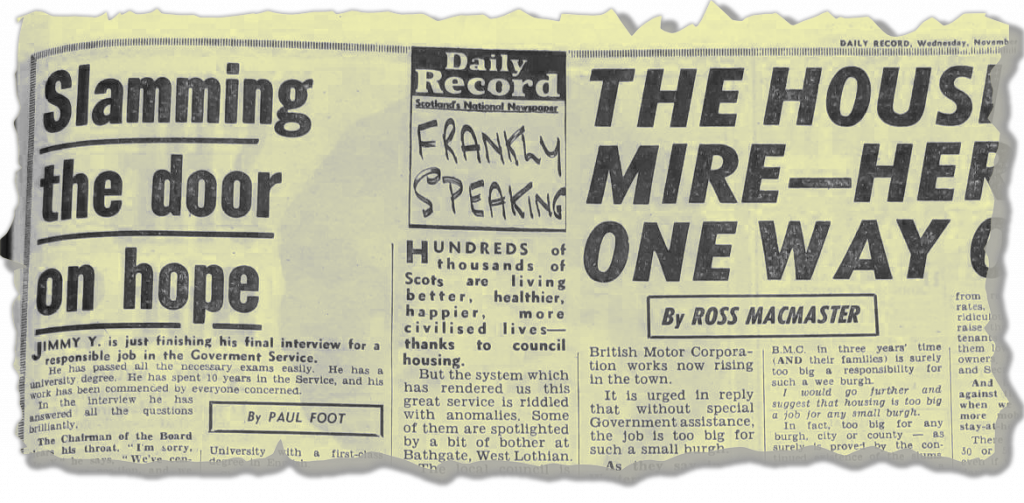JIMMY Y. is just finishing his final interview for a responsible job in the Goverment Service.
He has passed all the necessary exams easily. He has a university degree. He has spent 10 years in the Service, and his work has been commended by everyone concerned.
In the interview he has answered all the questions brilliantly.
The Chairman of the Board clears his throat. “I’m sorry, Mr. Y.” he says, “We’ve considered your position, and we cannot offer you the job you ask for.”
Jimmy asks for reasons, but the Board will only tell him: ” You are unsuitable.”
But Jimmy knows there is one simple reason for their decision. HE IS BLIND. He probably has the Board’s sympathy…but not their Job.
He is one of the 10,000 blind people in Scotland.
Only 382 of these many of them partialy sighted have chosen to work in ” open ” Industry, like Jimmy, alongside other men and women who have sight.
Only five
Many of them have fine educational qualifications. and are hard and keen workers like Jimmy.
Yet in the whole of Scotland only five blind people have risen while blind to a responsible position in industry, the Civil Service, or any of the professions.
These five became teachers.
This is NOT because the blind are not capable of doing such work. It is mostly because of PREJUDICE
Most blind children In Scotland go to the Royal Blind School at Craigmillar, Edinburgh
After schooling. officials decide on each blind one’s fate according to how “suitable” he or she is for various Jobs.
Many are sent “sheltered ” to industries specially organised for blind people.
Most of the others start work as telephonists and typists.
What happens to blind people who want to do more in life?
The Ministry of Labour says: “Most blind people capable of professional or executive careers are recognised during the stage of education at the Royal Blind School, and grants are made under the Disabled Persons Act to enable them to obtain professional qualifications.”
Little chance
Fine words-but what about the reality?
After looking at several cases involving blind people I find that there is VERY LITTLE chance of them succeeding at all.
Mr. Martin Milligan was a dux medallist at John St. Secondary School in Glasgow. He took a scholarship to Oxford, where he got a first-class degree in politics, philosophy, and economics.
For SIXTEEN YEARS he fought the authorities to get a better job, until eventually he was taken on as a lecturer at LEEDS University.
Miss Elizabeth Whitehead came down from Edinburgh University with a first-class degree in English.
She had won the Eliot Prize for the best student of the year in English. She has had three books published, one of them a prizewinner.
For NINETEEN years she struggled against red tape to get a job as a teacher.
During this time she turned down two offers of jobs as a physiotherapist and telephonist. Instead she taught crippled children for nothing.
She only got her job as a teacher after her case had been raised in the House of Commons and she had written to Sir Winston Churchill.
An M.A. from Edinburgh University tried to get a job as a home teacher. The examination entry needs no educational qualifications at all.
He has spent the last ten years as a telephonist in Glasgow.
Mr. Dick Craig trained himself until he took his Scottish Highers, three subjects at “A” level with distinction and a Diploma of Government Administration.
He has been working for 18 years as a telephonist and typist with the Ministry of Labour.
All this time he has been fighting to get a job suited to his abilities. Like many others he finds it almost impossible to enter the lowest possible grade of the Civil Service – the clerical grade.
What other barriers do blind people find when applying for jobs? One was told by a firm: “We have several flights of stairs in the building.”
The man lives at the top a of four-storey tenement.
Another was refused a telephonist’s job with the excuse: ” We do night shifts here.”
He told me: ” My life is a permanent night shift.”
Surely this shows that our idea of the blind person’s place in the world is WRONG.
Isolated
NOT ENOUGH trouble is taken to encourage blind people to play a proper role in society. We are too content to isolate them in the strained silent communities of darkness where they cause us no trouble.
NOT ENOUGH care is taken to find what responsible jobs blind people CAN do well. There are many obvious examples of these.
Blind men are often denied these posts because & fixed grading system means that they have to pass through a job which they obviously cannot do.
If a man who cannot see has the courage and ability to win the qualifications for a job, surely those in authority can summon up enough energy to remove the few obstacles in his way.
